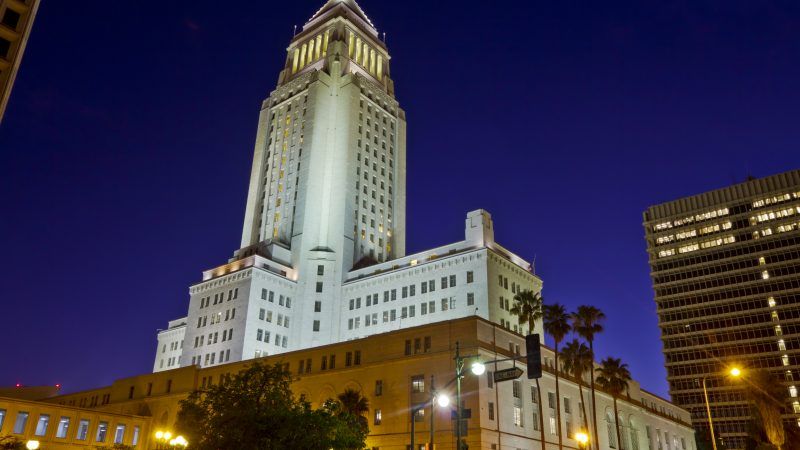Los Angeles Bans Developers From Making Campaign Donations
In the midst of a housing crisis, L.A. politicians have decided to limit their own incentives to allow more housing construction.

In the midst of an affordable housing crisis, Los Angeles politicians have decided to reduce their own incentives to approve more development. On Wednesday, the city council voted unanimously to ban developers from donating to candidates for city offices.
Under the new law, people and companies seeking discretionary city approval for real estate projects would be forbidden from donating to anyone running for mayor, city council, or city attorney while their project application is pending, and up to 12 months after it's approved.
Also barred from making campaign contributions are the corporate executives of development companies and investors who own up to 20 percent of these companies.
"Today, we took a crucial step in rebuilding trust in City Hall. There is nothing more fundamental than building trust in our democracy, and today, we are laying the foundation for a City Hall that works for the people," reads a Wednesday press release from City Councilmember David Ryu (D), for whom banning developer contributions has been a long-running priority.
Critics of the ban say it doesn't go far enough.
Councilmember Mike Bonin labeled the bill a "token & hollow ban" on Twitter, pointing out that while the legislation restricted developers from supporting campaigns, it left equally "insidious" fossil fuel executives and gun manufacturers untouched. Bonin's preferred solution is to publicly finance elections.
The Los Angeles Times editorial board similarly called yesterday's bill a "job half-finished," noting that the measure did nothing to stop subcontractors from donating to campaigns. Nor does it stop developers from hosting fundraisers or helping to bundle donations from other contributors, complains the Times editorial.
Less concerning to these parties is the way that the city's ban on developer donations is tilting the political playing field against people trying to fix the city's housing crisis by building more housing.
"Whenever a developer wants to do something, there's probably someone who lives near the development who probably doesn't want it," says David Keating, president of the Institute for Free Speech. "Essentially, L.A. has passed a law saying people with one interest in a decision by the council can support candidates, but the other side can't. In a sense, it's a form of viewpoint discrimination."
Indeed, there's no shortage of financially self-interested NIMBYs in Los Angeles who stand to gain from city councilmembers blocking new housing development.
That could include everyone from your standard homeowner worried that new development will reduce the value of their homes, to construction unions trying to slow down the planning process until a developer agrees to hire their guys, to activists kvetching about lost sunlight.
The logic behind Los Angeles' ban is that these folks have a greater right to influence the outcomes of elections than people trying to put up apartment buildings.
By allowing donations by people on one side of the issue, but not another, Keating says the Los Angeles ordinance could be vulnerable to a legal challenge on First Amendment grounds. He suggests that the city could achieve the anti-corruption purposes of the bill by issuing reports on which councilmembers are receiving developer contributions.
If the goal is to "get money out of politics," it would be even better to deregulate housing development such that city councilmembers aren't deciding the fates of individual developments. Developers will have fewer reasons to spend money on Los Angeles elections.
For instance, yesterday's legislation lists a number of specific city approvals developers would have to apply for before they'd be barred from donating to campaigns. These include things like density bonuses—where developers are allowed to build taller, denser buildings in exchange for including more affordable units—variances for height restrictions, a zone change for a property, or amendments to the city's general plan to allow for an otherwise prohibited type of development at a site. If developers were allowed to build what they wanted on the land they own, they wouldn't have to beg city officials for approval, thus eliminating any need to influence or corrupt these officials in the first place.
Obviously, that kind of sweeping deregulation of land use in Los Angeles is not going to happen any time soon.
Given that, a second-best option would be to try and strengthen, not weaken, developers' influence over local politics. Los Angeles has some of the highest housing costs in the country. Its residents would benefit immensely from a lot more housing construction. That construction can't happen if developers are shut out of politics.
Throwing money at political problems obviously isn't ideal. That money would be better spent investing in things people want and need rather than filling the campaign chests of people with too much power. But without massive deregulation of L.A.'s housing market, allowing developers to have their say in politics is the city's only hope for easing the housing shortage.
Rent Free is a weekly newsletter from Christian Britschgi on urbanism and the fight for less regulation, more housing, more property rights, and more freedom in America's cities.


Show Comments (29)